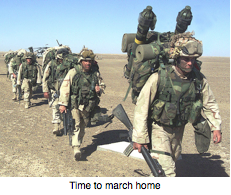Americans have for some time seemed to have an insatiable appetite for military spending. Defence was the sacred cow of their federal budget. Now it seems they are losing that appetite for at least one form of military expense—waging war.
The Afghan war is expected to cost the United States $118.6 billion in 2011, over four times Afghanistan’s GDP. The cost, soaring since Barack Obama became president, surpassed that of the Iraq war in 2010 when the U.S. spent $93.8 billion in Afghanistan versus $71.3 billion in Iraq. And these costs exclude long-term expenses such as veterans’ benefits for the returning soldiers which will persist for many years.
As the cost of the war has escalated, so has the desire of the American people to get out. According to a Pew survey, 56 per cent of Americans now want to remove their troops as soon as possible compared to only 33 per cent expressing this view when Obama assumed office. Only 39 per cent want the troops to remain until the situation has stabilized, down from 61 per cent over the same period.
Earlier this week, the United States Conference of Mayors approved a resolution calling for an early end to military involvement in Afghanistan and Iraq. They are asking Congress to redirect the billions being spent on war and reconstruction toward urgent domestic needs, saying that American taxes should be paying for bridges in Baltimore and Kansas City, not in Baghdad and Kandahar. This is the group’s first resolution on foreign policy since it called for an end to the Vietnam War forty years ago.
This growing recognition of limits to American power was neatly expressed by Senator Joe Manchin III of West Virginia who said, “The question the president faces—we all face—is quite simple: Will we choose to rebuild America or Afghanistan? In light of our nation’s fiscal peril, we cannot do both.”
President Obama does seem to be facing up to this reality. In his television address Wednesday evening, he declared that the “tide of war is receding” and announced the rapid withdrawal of the 33,000 “surge” troops. It isn’t all that rapid, actually—scheduled over a year and a half and it’s only the troops added since he became president—but it is in the right direction. He also hinted at a more militarily modest foreign policy, saying the country needs to “chart a more centered course” between “an isolation that ignores the very real threats that we face” and the urge to “overextend ourselves, confronting every evil that can be found abroad.”
If he carries through on all this, he has the opportunity to cut his country’s obscene defence budget without appearing to reduce security. And, of no less importance, he may bring much-needed relief from American aggression to the rest of the world.
